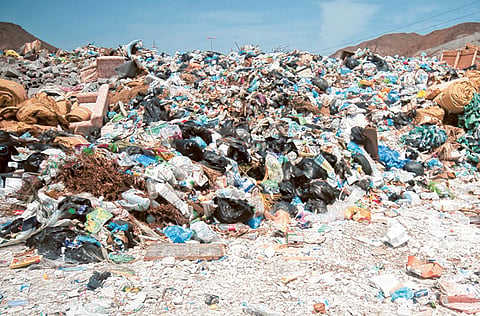Oman: Eco-friendly dump sites worth 62m riyals
62m riyals allocated for the project

Muscat: Oman has embarked on a major project worth 62 million Omani riyals (Dh589 million) to convert 350 uncontrolled ‘dumping sites’ across the country into high-tech controlled landfill sites, according to a senior official of Be’ah, the Oman Environmental Services Holding Company.
“The general environmental policies of Be’ah are to present eco-friendly sites to treat and to dispose the waste with high quality environmental standards around the country,” said Ahmad Al Farsi, Director of Projects and Environment at Be’ah.
He added that Be’ah would design these sites in such a way that they can accommodate the increase in the volume of waste generated by the growing population in Oman.
“There are 350 landfill sites in Oman and gradually all will be replaced with Municipal Solid Waste (MSW) Transfer Stations,” he revealed.
Currently, all kinds of waste are dumped in open fields, causing a stench as well as other environmental hazards. “Our aim is to set up state-of-the-art MSW Transfer Stations as well as controlled landfill sites,” Al Farsi added.
To start with Be’ah has awarded two contracts — one for Birka, 100km north of Muscat and another one in Fanja, 60km north-east of Muscat. “The Birka MSW Transfer Stations would cost around four million riyals while one in Fanja will be built at a cost of 825,000 riyals,” he said.
Giving details of the MSW Transfer Stations, Al Farsi said that it would have an administration office besides technical staff. “The Fanja MSW Transfer Station will have an initial capacity to take around 50 tonnes of waste per day,” the senior Be’ah official said.
He said that the waste collected at the MSW Transfer Station would be transferred immediately to a designated eco-friendly sanitary landfill site in the region. “Every region will have designated eco-friendly sanitary landfill sites,” he added.
“Our main objective is to prevent environmental risks due to the current practices of dumping waste in open areas and replacing that with controlled sanitary landfill sites,” Al Farsi said.



![Oman’s Maritime Security Centre confirmed four crew members injured. [Illustrative image. ]](http://media.assettype.com/gulfnews%2F2026-03-01%2Fv5np7wj5%2FOil-tanker.jpg?w=320&auto=format%2Ccompress&fit=max)